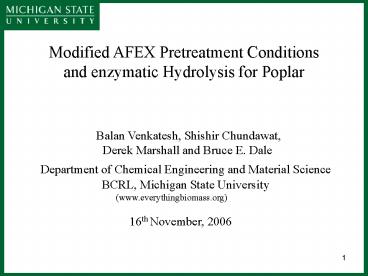Modified AFEX Pretreatment Conditions - PowerPoint PPT Presentation
1 / 18
Title:
Modified AFEX Pretreatment Conditions
Description:
AFEX Conditions: 100 oC, 1:1 (BM:Ammonia), 10 min. residence time ... Modified conditions like soaking and autoclaving prior to AFEX ... – PowerPoint PPT presentation
Number of Views:254
Avg rating:3.0/5.0
Title: Modified AFEX Pretreatment Conditions
1
Modified AFEX Pretreatment Conditions and
enzymatic Hydrolysis for Poplar
Balan Venkatesh, Shishir Chundawat, Derek
Marshall and Bruce E. Dale
Department of Chemical Engineering and Material
Science
BCRL, Michigan State University
(www.everythingbiomass.org)
16th November, 2006
2
Ammonia Fiber Expansion (AFEX) Pretreatment
Process
Ammonia Recovery
Gaseous
Recycle
Ammonia
Ammonia
Treated
Biomass
Heat
Biomass
Expansion
Reactor
- Conditions we wary
- Temperature (70-180 oC)
- Moisture content of biomass (40-80)
- Ammonia to biomass ratio(11-31)
- Residence time (5-30 min.)
More details in Understanding AFEX
presentation Friday, Nov. 17th 12. 50 p.m.
(672b), HSF, continental 7
3
Conversions on Different Feed stock
Corn Stover (CS)
Poplar (HLP)
AFEX Conditions 90 oC, 11 (BMAmmonia), 5 min.
residence time Enzyme Loading 15 FPU cellulase,
64 pNPGU of b-glucosidase Reaction
condition 50oC, 90 rpm, 168 h
HLP- High Lignin Poplar
4
Conversions for Two batches of Poplar
HLP- High Lignin Poplar LLP- Low Lignin Poplar
AFEX Conditions 100 oC, 11 (BMAmmonia), 10
min. residence time
5
- Strategy
- Low temperature pretreatment was not effective,
hence went for - higher temperature
- Modified conditions like soaking and
autoclaving prior to AFEX - Tried different enzyme combinations and
surfactant effect - Understand the degradation product formed during
the pretreatment - by LC-MS and LC-UV techniques.
- High throughput AFEX (lesser heat transfer
problem) for wide - range of screening conditions
6
Reaction conditions and Enzyme Loading
Substrate HLP-High lignin poplar,
LLP-low lignin poplar AFEX Condition 100 oC/180
oC, 11 (BMAmmonia) Enzyme Loading mg of
protein/g of glucan Abbreviation
C-Spezyme CP Cellulase, X-Multifect Xylanase,
P-Pectinase, F- Depol
720 Feruloyl esterase,
A-Additive (Tween 80)
7
To summarize
60FPU of cellulase loading
8
Hydrogen bonding in cellulose
2D
9
Synergy Experiments on High Lignin Poplar (HLP)
160
Enzyme Combinations 31.3 mg Cellulase (C) 64
pNPGU bG (bG)/g of Glucan and/or Xylanase (X 10,
25, 50, 100) (3.1, 7.75, 15.5, 31.0 mg)/g of
Glucan Pectinase (P10, 24, 50, 100) (5.6, 14, 28,
56 mg)/g of Glucan Feruloyl esterase (F 10, 25,
50, 100) (1, 2.5, 5, 10 mg)/g of Glucan
10
Overall Sugar Yield for HLP and LLP
25.7
28.7
18.1
14.9
13.7
7.9
71.3
74.3
42.8
71.3
37.2
66.9
AFEX Condition 180 oC, 70 moisture, 10 min.
11 (ammonia Biomass) Sample Autoclaved prior
to AFEX 168 h hydrolysis
LLP Low Lignin Poplar HLP High Lignin
Poplar MSY Maximum Sugar Yield 15 - 15 FPU of
cellulase 60 60 FPU of cellulase
11
Representative Chromatogram
AFEX treated HLP
1, formic acid 2, malonic acid 3, lactic acid
4, acetic acid 5, maleic 6, succinic 7,
fumaric 8, t-aconitic acid 9, levulinic
Acid 10, glutaric acid 11, itaconic 12,
2-hydroxy-2-methylbutyric acid 13, gallic acid
14, 5HMF 15, 2-furoic acid 16, furfural 17,
adipic acid 18, 3,4-dihydroxylbenzoic acid 19,
3,4-dihydroxybenzaldehyde 20, 4-hydroxylbenzoic
acid 21, 2,5-dihydroxylbenzoic acid 22,
4-hydroxybenzaldehyde 23, vanillic acid 24,
homovanilic acid 25, caffeic acid 26, syringic
acid 27, 4-hydroxyacetophenone 28, vanillin
29, 4-hydroxycoumaric acid 30, syringaldehyde
31, benzoic acid 32, ferulic acid 33, sinapic
acid 34, 3-hydroxy-4-methoxycinnamic acid 35,
salicyclic acid 36, 4-hydroxycoumarin 37,
o-toluic acid and 38, p-toluic acid.
Untreated treated HLP
The samples were analyzed by LC-MS for
qualitative purposes only. However, the
concentrations determined using UV detection may
exhibit a high bias due to unidentified
co-eluting components.
12
Comparing Degradation Products
Unknown compounds co-elute along with lactic
acid
Collaborative work with Dr. Kevin at Baylor
Institute of Technology Ref.Dilute acid
hydrolysate data from Chen et al., 2006
13
High Throughput AFEX Unit
14
Untreated and AFEX treated Poplar samples at
different conditions
Untreated
140 oC, 11
140 oC, 11.5
140 oC, 12
140 oC, 11
140 oC, 11.5
140 oC, 12
160 oC, 11
160 oC, 11.5
160 oC, 12
160 oC, 11
160 oC, 11.5
160 oC, 12
180 oC, 11
180 oC, 11.5
180 oC, 12
180 oC, 11
180 oC, 11.5
180 oC, 12
Water un-soaked prior to AFEX
Water soaked prior to AFEX
All experiments done with 70 moisture and 30
minutes resident time
15
Some preliminary results
72h Hydrolysis
Enzymatic hydrolysis 50 oC, 90 rpm US- un-soaked
High Lignin Poplar
16
- Conclusion
- Combination of autoclaving followed by AFEX
gives better Glucan yield - both for high and low lignin poplar
- Collective sugar yield for high and low lignin
poplar was summarized - for the best AFEX treated poplar
- At elevated temperature and in the presence of
ammonia, some sugar - degradation products like organic acid is
formed, based on LC-MS/LC-UV - studies
- Introduction to High through put AFEX (new tool
to screen the - different feed stock)
17
Acknowledgement
- CAFI team for their valuable suggestions
- Genencor for supplying their enzymes
- Dr. Kevin and Dr. Walsum for doing LC-MS and
LC-UV analysis - DOE for funding
18
Biomass Conversion Research Lab at Michigan
State University
Left to Right (Back) Shishir, Derek, Bryan,
Ming Left to Right (Front) Elizabeth, Dr. Dale,
Dr. Ven, Holly, Ben































